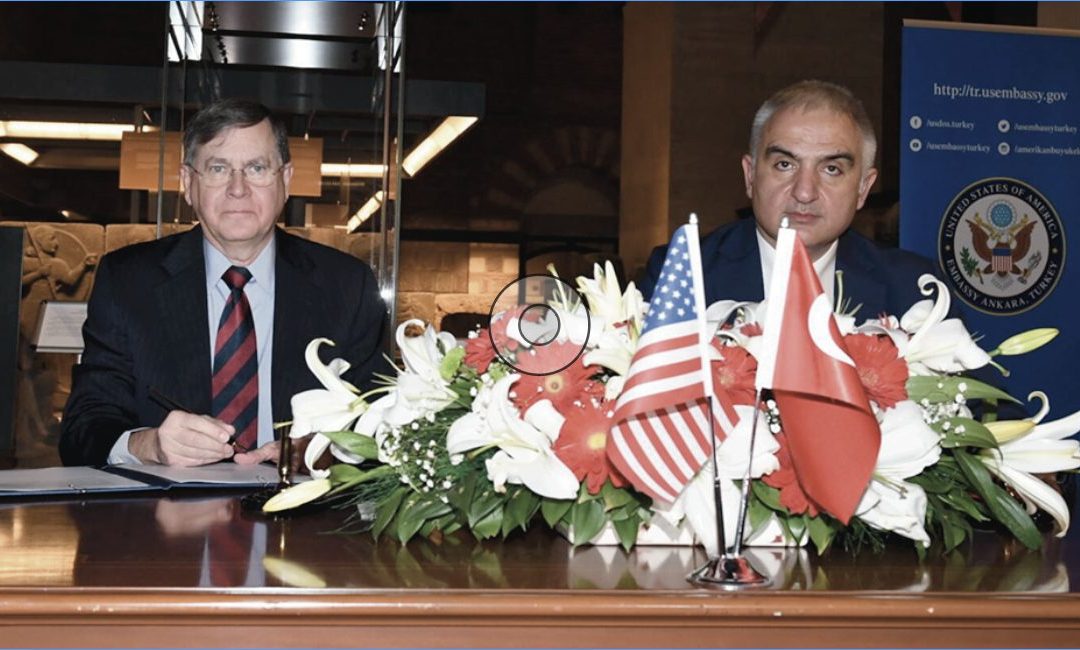In 2001, the Taliban took 25 days to blow up the extraordinary and important Bamiyan Buddhas – two ancient monumental cliff carvings in Afghanistan that were the largest standing statues of their type in the world.
It was as much a political as religious act of cultural vandalism by iconoclastic extremists who were demanding recognition and the acknowledgement of Islam’s pre-eminence in a country with a Buddhist tradition.
Who would have thought that less than a quarter of a century later, it would become official policy for the United States to repatriate Afghan cultural property to the Taliban, now the oppressive government of a people it subjects to innumerable human rights abuses on top of the cultural nihilism?
But that is exactly what is happening now in the name of U.S. citizens, and it is far from an isolated case.
This state of affairs is all part of a wider move by authorities in the U.S. and elsewhere to harness cultural heritage as a low-cost and highly useful soft power diplomacy tool. Help other countries recover artefacts that were either stolen or sold off legally before passing beyond their borders and it can assist power brokers such as the U.S. to boost their geopolitical influence in trouble spots where unwelcome rivals such as China and Russia may be gaining a foothold.
It may be a cheap and effective political tool, but where are the ethics and morals of such a policy, and who loses in the process?
A recent case involving the Manhattan District Attorney’s Antiquities Trafficking Unit sheds light on this.
Chinese or Tibetan?
As reported in March 2025, the unit, under the command of Assistant D.A. Matthew Bogdanos, handed over 41 artefacts to China on March 3. The problem is that the artefacts were not Chinese but Tibetan.
“The transfer was conducted as part of an agreement between the two countries to protect cultural heritage and identity and prevent Chinese cultural relics from illegally entering the U.S.,” reported Radio Free Asia. “Since the pact was first agreed to on Jan. 14, 2009, the U.S. has sent 594 pieces or sets of cultural relics and artworks to China.”
Returning cultural property to the oppressors of those to whom they should actually belong rightly raises concerns: “…sending Tibetan artifacts to China has raised concern that Beijing will use them to justify its rule in Tibet, which the country annexed in 1950,” RFA argues.
This view was echoed by Vijay Kranti, director of the Center for Himalayan Asia Studies and Engagement, based in New Delhi, who told the RFA: “The Chinese government will certainly misuse these returned artifacts and will use them to further promote their false historical narrative that Tibet has always been a part of China.”
Kate Fitz Gibbon, executive director of the Committee for Cultural Policy, the U.S. think tank established in 2011 to strengthen the public dialogue on arts policy, was equally critical.
“It is an outrageous act to return Tibetan objects in the diaspora to the People’s Republic of China, which is deliberately destroying Tibetan cultural heritage,” she said.
“Since China occupied Tibet, U.S. authorities have accepted that Tibetan artifacts belong to the Tibetan people, not China’s government,” Fitz Gibbon said in an email. “The turnover by the Manhattan District Attorney’s Antiquities Trafficking Unit directly challenges that policy.”
It is certainly an odd move when the D.A.’s office and ADA Bogdanos spend so much time declaring their dedication to righting historic wrongs.
What Memoranda of Understanding mean
If the Manhattan D.A. uses New York State law relating to theft to pursue its seizures and returns, the U.S. State department and Customs service take advantage of an ever-expanding system of bilateral agreements, also known as Memoranda of Understanding.
These allow law enforcement to bypass international conventions and human rights laws and conventions, giving them the authority to seize almost anything historic that originated in the country of an MoU partner, before handing it over to them. No evidence of the item in question being illicit is required. This is hardly in the spirit or terms of the United States Constitution.
As an example, consider the MoU with Turkey, which is up for renewal. Article 1 of the MoU restricts the import to the U.S. of a comprehensive list of archaeological material ranging in date from 1.2 million years BC to 1770 AD, and a similarly extensive list of ethnological material ranging in date from the 1st century AD until 1923.
Essentially, anything that falls into either of these categories – pretty much everything – will be seized at the U.S. border as it is imported and returned to Turkey unless it already has a valid export license from Turkey or Turkey agrees to issue it with a licence saying that its original export from Turkey did not violate local laws.
Effectively, then, the U.S. has handed a veto to a third country over legally held property that allows for its confiscation without proof of wrongdoing. Under such circumstances, this interference with an individual’s right to enjoy their property can easily be assessed as arbitrary – and therefore a direct breach of Article 17.2 of the Universal Declaration of Human Rights. The problem is that the UDHR is not a binding treaty, but the United Nations does consider that its member states, which include the U.S., have a moral obligation to respect the fundamental human rights in the Declaration. However, as this issue shows, they don’t. Constitutional rights also appear to have been cast aside here.
Turkey or Armenia?
The MoU with Turkey is highly relevant now as the Cultural Property Advisory Committee (CPAC), which officially advises Congress, considers its renewal and update.
Objections to its standing terms have come from the Armenian Bar Association and the International Association of professional Numismatists (IAPN).
The Armenian Bar Association is concerned that without its proposed amendments to the MoU, Turkey may lay claim to Armenian cultural artefacts that predate the arrival of Turks in the Armenian homeland which is now part of modern Turkey. “Equally perverse, Turkey may argue that Armenian cultural property currently located in the United States, which originated on the land mass of current-day Turkey, belongs to Turkey as well and, therefore, must be repatriated,” it argues.
Likewise, the International Association of Professional Numismatists (IAPN) has raised objections to the renewal of MoUs with Afghanistan and Turkey. IAPN Executive Director Peter Tompa set out the association’s detailed objections in his Cultural Property Observer blog, arguing that for both countries, “renewals raise fundamental contradictions that cannot possibly be reconciled”.
In tune with the Armenian Bar Association, Tompa also objects to a renewal of the Turkey MoU on the grounds of Turkey laying claim to the cultural heritage of minority groups within its borders: “Erdogan’s aggressive repatriation efforts abroad must be contrasted with his government’s active promotion of ‘treasure hunting’ at former Jewish and Christian sites at home. This is just another provocation directed at minority religious groups like the conversion of Hagia Sophia and the Cathedral at Ani into mosques,” he writes.
Tompa had previously raised concerns about Jewish artefacts being returned to the Libyan government that had expelled the Jews.
Libya or the Jews?
“Jewish groups are outraged and say the MoU legitimizes the confiscation of Jewish property seized by Libya’s government when they were forced from the country,” Tompa wrote in 2018. “Others in the cultural policy world are wondering why the US government would put faith in Libya to act responsibly to safeguard the heritage of minority and exiled peoples.”
Add to all this the fact that many of those regimes with whom the U.S. establishes these bilateral agreements are not only lacking in democratic principle, but actively hostile to the U.S., and the injustice burns all the brighter.
Tompa has also written in-depth in Cultural Property News on how MoUs work and what they mean.
How aware are U.S. citizens that their own State department and Customs service are acting like this in their name or that they might find their own property subject to such confiscation? And how would they feel about it, particularly if their own legally held property was seized in this way? Will CPAC do the right thing in advising Congress?
Image caption: US Ambassador to Turkey David Satterfield and Turkish Minister of Culture and Tourism Mehmet Ersoy sign an MOU on cultural heritage, effectively acknowledging Turkish government control of minority religious communities’ heritage. Photo Credit: US Embassy in Turkey


Recent Comments